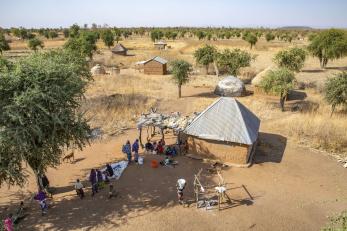Bridging divides: How dialogue and mediation birthed unity in Karkara Village

Peace is essential for the economic growth and overall prosperity of any society. In times of conflict, a society’s development is severely hindered, preventing its citizens from realizing their full potential. Despite its crucial role, peace is continually under threat from various challenges, including poverty, disease, violence, widespread human rights abuses, terrorism, and environmental degradation. This has been particularly evident in northwest Nigeria, where the longstanding farmer-herder conflicts have persisted for decades, undermining stability and progress in the region. The crisis has led to the loss of lives and property. Many people have been displaced from their homes, and countless livelihoods have been disrupted.
In Karkara village, Daddara District in Jibia local government area (LGA), Katsina State, tensions between farmers and herders escalated to a boiling point as a result of conflict over shared resources. For many years, both the herders and farmers have relied on the same water source – a small borrow pit – to sustain their domestic activities and livelihoods. The water was used by farmers to water their crops and for daily household needs, while herders depended on it for their cattle and personal use. As the dry season begins, water becomes scarce, and competition for this important resource grows. This leads to tense confrontations and, eventually, violent clashes.
Ibrahim Sani*, a member of the Community Response Network (CRN) in Jibia district whose name has been changed to hide his identity, stated that these clashes led to the loss of lives and livelihood in the community.
“The cause of the conflict is the fight between herders and farmers over water, the farmers used to fetch the water for their daily use while the herders used to bring their cattle to the water for grazing in that matter the farmers accused the herders for spoiling the water with their cows, this is the beginning of the conflict” - Jamila, a female community resident said.
“In this community, the main thing that causes peace Instability is between farmers and herders, everyone is seeing other as hypocrite and everyone is attacking each other” – Yunusa, another female community resident said.
Having been impacted by these clashes, Ibrahim felt the need to act and find a way to resolve the issue. He had previously received training in Interest-Based Negotiation and Mediation (IBN+M) through Mercy Corps' Conflict Mitigation and Community Reconciliation (CMCR) program in North West Nigeria. Equipped with skills in conflict resolution, mediation, and dialogue facilitation, he set out to find a solution to the ongoing conflict. He began by holding separate meetings with the farmers and herders, providing each group with a safe space to express their concerns and grievances. The objective was to ensure that everyone felt heard and understood. He also encouraged both parties to engage in a series of open, inclusive dialogues aimed at fostering mutual understanding and cooperation.
My actions have changed because of the program.
The dialogue provided a platform for both the farmers and herders to recognize their shared interests which is their mutual dependence on the water source and their common goal of sustaining their livelihoods. Ibrahim helped facilitate an agreement where the water source would be divided: one side for the cattle to drink from, preventing contamination of the entire water body, and the other side reserved for those needing clean water for drinking and household use.
Following the dialogue, both parties took immediate action, demonstrating a strong commitment to uphold their part of the agreement. Since then, violent incidents related to water resources in the community have significantly decreased. Gradually, the eroded trust between the groups has started to rebuild, with community members now engaging more openly, offering suggestions, and collaborating on ways to protect the shared water source.
“Through the training on how to negotiate, the CMCR program has brought peace and understanding to our community. We did not have this before" a Musa, a resident of Daddara district said.
“My actions have changed because of the program. I have always had a very strong mind and that led me into a lot of trouble in the past. However, since the CMCR program began I have gained an understanding that causing troubles will always keep peace far from me. I now understand the many ways of negotiation," said Abubakar, another resident.
“The communities understand peace, reconciliation and dialogue through the orientations by Mercy Corps and some accompanied suggestions that suit the progression of peaceful coexistence”
What once seemed like an insurmountable divide has gradually closed, and the spirit of cooperation has been restored in Karkara village. The community, which had once teetered on the brink of violent conflict, now stands united in their shared commitment to peaceful coexistence and sustainable resource management. Through dialogue and collaboration, they have laid the foundation for long-term harmony and development.
This transformation aligns with the United Nations Sustainable Development Goals (SDGs), particularly Goal 16 (Peace, Justice, and Strong Institutions), which seeks to promote peaceful societies and effective conflict resolution, and Goal 6 (Clean Water and Sanitation), which emphasizes the importance of equitable access to water. By coming together to resolve their differences, the people of Karkara have not only safeguarded their livelihoods but have also set a powerful example of how communities can turn challenges into opportunities for collective progress.
About the Conflict Mitigation and Community Reconciliation (CMCR) program
The Conflict mitigation and community reconciliation in Northwest (CMCR-NW) Nigeria program, jointly implemented by International Organization for Migration (IOM), Mercy Corps (MC), and Center for Democracy and Development (CDD) is an 18-month initiative aimed at reducing community violence, promote locally driven peace initiatives, and mitigate conflicts over natural resources in Katsina State of Northwest Nigeria. Funded by the European Union (EU), the pilot program is being implemented in 4 local government areas (Batsari, Danmusa, Jibia and Kankara) that have been experiencing insecurities resulting from banditry, farmer-herder, and communal clashes, exacerbated by impact of climate change on the land and water resources.